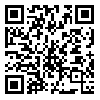Volume 12, Issue 55 (vol. 12, no. 55 2023)
2023, 12(55): 81-90 |
Back to browse issues page
Download citation:
BibTeX | RIS | EndNote | Medlars | ProCite | Reference Manager | RefWorks
Send citation to:



BibTeX | RIS | EndNote | Medlars | ProCite | Reference Manager | RefWorks
Send citation to:
Vojodi Mehrabani L, Kheirollahi N. Effects of salinity stress and foliar application of mineral elements and methanol on growth and some physiological traits of Coriandrum sativum L.. Plant Process and Function 2023; 12 (55) : 9
URL: http://jispp.iut.ac.ir/article-1-1677-en.html
URL: http://jispp.iut.ac.ir/article-1-1677-en.html
1- Department of Agronomy and Plant Breeding, Azarbaijan Shahid Madani University, Tabriz, Iran , vojodilamia@gmail.com
2- Department of Agronomy and Plant Breeding, Azarbaijan Shahid Madani University, Tabriz, Iran
2- Department of Agronomy and Plant Breeding, Azarbaijan Shahid Madani University, Tabriz, Iran
Abstract: (1556 Views)
The idea was to assay the salinity (0, 50 and 100 mM) impacts on Coriandrum sativum by the foliar application of nano-Zn, FeSO4, MgSO4 and methanol in possibly the salinity stress side-effects. A factorial experiment was arranged based on a completely randomized design with three replications in pot at Azarbaijan Shahid Madani University. The results revealed that salinity × foliar treatment significantly affected plant dry weight, relative water content, catalase activity, and elemental content of plants. The top recorded data (P≤5%) for, plant dry weight and chlorophyll b content was with non-salinity × all foliar treatment. No-salinity and NaCl50mM × methanol foliar application increased K content in plant. 50 mM NaCl × FeSO4 and nano-Zn spray increased catalase activity. Foliar spray with methanol, FeSO4 and nano-Zn × no salinity increased N content. The highest relative water content belonged to no salinity × FeSO4 and nano-Zn and NaCl50 mM × FeSO4 treatment. The top content of Fe, P, Ca and K/Na were recorded at non-saline conditions. 50 mM NaCl increased the essential oil content of the plant. 100 mM salinity treatment increased malondialdehyde, H2O2, Na and proline contents. Foliar treatment with FeSO4 and MgSO4 increased the essential oil content of the plant. As well Coriandrum sativum was sensitive plants to salinity, and foliar treatments especially FeSO4 and nano-zinc ameliorated the adverse side-effects of salinity in plants.
Article number: 9
Type of Study: Research |
Subject:
Salt Stress
Received: 2022/01/31 | Accepted: 2022/08/2 | Published: 2023/09/2
Received: 2022/01/31 | Accepted: 2022/08/2 | Published: 2023/09/2
Send email to the article author
| Rights and permissions | |
 | This work is licensed under a Creative Commons Attribution-NonCommercial 4.0 International License. |







